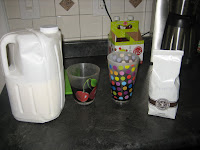Education is "Good" and Coffee Can Help
“Good”—the publication available at your local Starbucks is continuing to tackle the challenging issues. Its format aims for maximal communication in a simple, to-the-point way.
Looking at the issue dedicated to “Education” is a great by-the-numbers way to understand the issue that rocks us to the core and literally drives almost all real estate decisions among those who have children. There are, for example, a total of 98,905 public schools in the
What would a conversation about education be without weighing the pros and cons of No Child Left Behind (NCLB), the idea that became a law in 2001 under the watchful, hawkish eyes of President George W. Bush. State governments must create math, science, and reading standards and test against those standards. Federal funding is tied to performance. Proponents suggest that testing improves accountability, while critics point to the huge disparities between tests in different states. Detractors also suggest that creativity is shunted and different learning styles are not nurtured or even acknowledged.
The net net of all of this is the same thing: Education is the foundation for life. And yes, creativity matters. At the most fundamental level, exposure bolsters confidence, which makes room for creativity, which supports persistence, and can eventually lead to a happiness of sorts---intellectual curiosity and drive and the ability to translate intellectual gifts into activities in the world, including professional pursuits, art, writing, child-rearing, and even being a good conversationalist.
And in this midst of this all, there is a role for coffee! Meta-analytical data shows that coffee trumps placebo when it comes to enhancing executive functioning and planning. Researchers have shown that in young people with attention deficit disorder, a median dose of 150 milligrams of caffeine enhances attention. (They do not suggest larger doses.) Plus, caffeine improves problem-solving and logistical reasoning skills and has an overall positive effect in people with attention deficit or hyperactivity disorders, precisely because it decreases aggression.
Most adults know that coffee has a focusing effect---and when those effects are considered in the academic setting, their impact can be profoundly positive.
Another day to learn… another day to drink coffee…another day to engage with other people in a transformative, open, and meaningful way. Have a great day!


Comments
Thanks!
Alma
Coffee is also associated with a reduced risk of liver cancer (especially in people who are very heavy drinkers)...
To your health!
Nicole